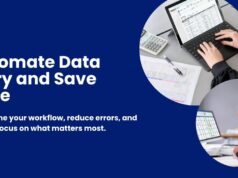If you have been looking for career choices, you just might have come across the idea of a data entry clerk. It’s a role that’s vital to the functioning of innumerable industries, but one that’s often misunderstood. Data entry Clerks are a vitally importantdata connection between the information that a business has and the systems that are used to process that information; they are the backbone of a successful, organized, and efficient business.
Whether you are a job seeker, a student weighing your first role, or someone looking to pivot your career, this guide will unpack what a data entry clerk does, the skills needed and where the job could take you.
What is Data Entry, and Why Does it Matter?
Data entry basically means entering, updating, or maintaining information in a company’s database or system. This could involve anything from customer information, financial records, or sales data to more specialized data depending on the industry.
Why is data entry important? With the right and well-organized data in place, organizations can make informed decisions. Managing it ensures records are up to date, operations run smoothly, and businesses comply with regulation. Without proficient data entry operators, businesses may face disorder, unproductive functioning, and huge losses.
Core Responsibilities of a Data Entry Clerk
Data entry clerks handle a variety of tasks that revolve around the organization and management of data. Here’s what their day-to-day work often looks like:
1. Data Input
This is the task most associated with the role. It involves entering high volumes of data into computer systems or databases from forms, surveys, invoices, or written records. Speed and accuracy are crucial.
2. Updating Records
Many businesses rely on data that’s constantly changing. Whether it’s updating customer addresses or revising inventory levels, ensuring records remain current is a significant part of the job.
3. Verifying Data Accuracy
Mistakes happen, but errors in data can have far-reaching consequences. Data entry clerks are responsible for cross-checking entries for accuracy and correcting any discrepancies.
4. Managing Digital and Physical Files
While much of their work revolves around digital data, clerks may also organize, label, and archive physical files.
5. Collaboration Across Teams
Data entry clerks often work closely with other departments to retrieve missing information or clarify unclear records.
6. Maintaining Confidentiality
Data entry clerks frequently handle sensitive or proprietary information, such as employee records or financial statements. Ensuring that privacy is maintained is vital.
By providing these services, data entry clerks support the smooth functioning of critical business processes across multiple industries.
Skills You Need to Succeed in Data Entry
To thrive as a data entry clerk, you’ll need to master certain skills. Here’s what employers typically look for:
1. Typing Proficiency
- A fast and accurate typing speed is the foundation of data entry.
- Many roles require speeds of at least 40-60 words per minute (WPM) with a minimal error rate.
2. Attention to Detail
- Tiny errors can create significant problems. Being meticulous and focused is essential when working with large volumes of data.
3. Familiarity with Software
- Knowledge of tools like Microsoft Excel, Google Sheets, and other database management systems is often a basic requirement.
- Depending on the industry, you might also need to learn niche software, such as SAP or Salesforce.
4. Time Management
- Data entry roles often involve tight deadlines, so effective time management and prioritization are crucial.
5. Organizational Skills
- Handling multiple tasks and maintaining clear, logical structures for data is paramount for long-term success.
6. Basic Communication Skills
- You’ll often need to communicate with colleagues to clarify errors or gather missing information.
While technical skills are necessary, developing traits such as patience, reliability, and adaptability can set you apart as a competent data entry clerk.
Where Data Entry Clerks Work
The environment of a data entry clerk has evolved significantly, especially with the rise of remote work. Here are the typical work settings:
1. Office Settings
Traditionally, data entry clerks have operated from administrative offices, contributing to industries like healthcare, finance, retail, and logistics.
2. Remote Opportunities
Many companies now offer data entry clerk positions that can be done entirely from home. All you need is a computer, a stable internet connection, and the right software.
3. Contract Roles and Freelance Work
The gig economy has created opportunities for freelance data entry work. Platforms like Upwork and Fiverr often feature short-term projects for those interested.
With more organizations digitizing their operations, the demand for skilled data entry professionals is expected to rise in both traditional and remote formats.
Career Path and Growth Opportunities
Contrary to popular belief, a role as a data entry clerk isn’t always a dead-end job. It’s often considered an entry point into other fields like administration, data analysis, and beyond.
Here’s how your career could evolve:
- Specialized Roles
With experience, you may transition into niche areas like medical coding, transcription, or technical data management. Specialized roles often come with higher pay.
- Administrative Positions
Since data entry clerks work closely with administrative teams, moving into roles like office management or executive assistance is a natural progression.
- Data-Focused Careers
If you develop a strong interest in data, you might pursue roles like data analyst or database administrator, which involve more advanced skills and responsibilities.
- Upskilling Opportunities
Continuing education and certifications can open doors to higher-level roles. For instance, learning SQL or earning certifications in database management systems can significantly boost your career prospects.
Data entry is not only a job but also a stepping stone into a variety of fields that allow people to grow and thrive professionally.
Why Data Entry Clerks are Vital Across Industries
Regardless of the industry, data entry clerks are key to facilitators in keeping tasks running and operations working smoothly. In healthcare by ensuring medical records are accurately entered or in retail by keeping track of sales, data entry people play a role in the success of countless businesses.
If you’re detail oriented and have a knack for organization but want a foot in the door to a stable and rewarding career, data entry clerk fasts a great way to begin building your professional life.
Considering a data entry career? Acquire the tools and skills you need, and you’ll be well on your way to achieving success.
Want more tips about careers, or ways to prepare for your new role? Discover our other tools created to ensure you can take that next step as you should.










